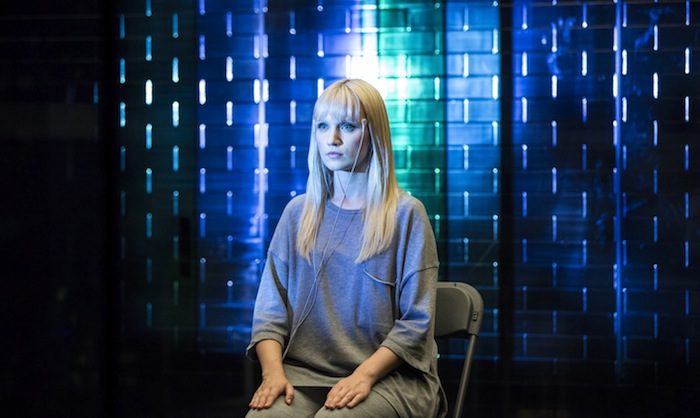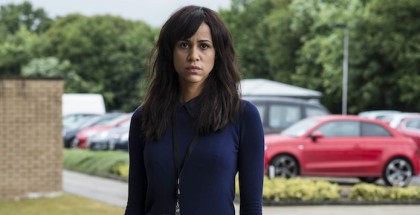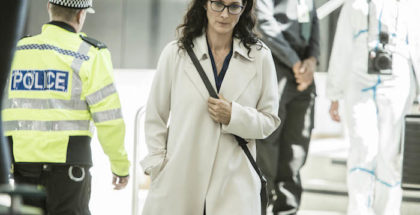UK TV review: Humans Season 2, Episode 3
Review Overview
Moving declarations
8Hidden emotions
8David Farnor | On 14, Nov 2016
Warning: This contains spoilers.
Can robots feel? That’s the question that drives the whole of Humans Season 2’s third episode – and the answer is as moving as you’d expect.
Channel 4’s drama has always excelled to being able to find the emotional depths in all of its ensemble, humans and non-humans alike; Odi and Dr. George Millican’s story in Season 1 was moving because we could appreciate the pain felt by both, while the unearthing of Mia/Anita’s tragic backstory was matched by the equally sad past of Laura Hawkins (Katherine Parkinson). Episode 3 is all of that empathy condensed into one powerful nutshell, one made more powerful by the fact that all of the pieces within it have been separated just enough to give them room to make an impact.
At the centre is Niska (Emily Berrington), who is still being scrutinised by doctors, as Laura tries to prove that she is conscious. The people in suits are wary, as they fear Laura and Niska are trying to sneak synths’ rights in through the back door, but they’re also curious, and so the tests continue. Pictures are shown to her, while her pulse and cognitive activity are monitored, all to no avail. It’s a fantastic set-up, as it opens the door to the question not whether Niska can feel – we already know she can – but how she communicates what she feels. It’s like watching the Voight-Kampff test being invented, with fewer upside-down tortoises. Laura, who has presumably seen Blade Runner, points out that they’re evaluating Niska’s consciousness in human terms, not on machine terms; they’re looking for signs of what people would normally do. Heck, they’re not even examining her pupils.
And so Laura hits on the idea of playing music to her – and we instantly begin to notice a slight shift in Niska’s reactions. The club from Episode 1 emerges in a flashback, as she remembers her time with Anita (whose number, heartbreakingly, she’s kept in her pocket). And yet, just before the happiness and longing can show on the surface, the track changes and the scientists move on. Still negative results.
Berrington has long been one of the show’s best performers, capable of conveying anger, hatred and, as of this season, attraction and compassion, but in a way that requires even more subtlety than Gemma Chan; Niska has to be visibly conscious, but only just, masking it enough for us to believe that other humans might not notice it. (She’s supported by the excellent editing, which shows us that flashback other characters can’t see, allowing us to empathise, while still maintaining that dramatic tension.)
We just have to look to see how our human cast are feeling, of course; Joe’s glance at his boss, after he is rehired by his old company in a lowly manual job, as part of a redundancy back-to-work scheme, displays all the frustration we need. How brilliant, then, that his youngest daughter spends her days pretending to be a synth – a faux-emotionless detachment that really betrays how much she misses having Mia around the house. His son, meanwhile, is intrigued by a girl at school who seems to be doing the same, and his elder daughter, Mattie (Lucy Carless), is taking it upon herself to use Niska’s code to wake up Odi (Will Tudor) from Season 1. They’re all connected to synths in some way, with each bond only emphasising how human they are. (Compare that to Odi’s poignant awakening, as he realises that, firstly, he can feel, and secondly, that he doesn’t work properly.)
A happier human-synth relationship remains Pete (Neil Maskell) and Karen (Ruth Bradley), as she returns back to the police station for normal duty. When a colleague spots that’s something up with her, tellingly, she doesn’t think of machines and robots, but that it’s merely a clandestine workplace affair. Sure enough, despite Pete accepting her for who she is, Karen spends her processing power on pretending to be human – a commitment that sees her down the pub for drinks with workmates, only for her internal poisonous fluids to spread, and Pete to have to switch her off for repairs.
His loyalty is what shines through – after Kill List and Utopia, the chance to see Maskell’s nice side remains surprising and effective – and the same is true of Athena Morrow (Carrie-Anne Moss), who gets a chance to show us more of her human side. It’s a sign of how good Humans is that its narrative strands are driven by emotional revelations, rather than plot twists. In the case of Dr. Morrow, it’s that V, her AI, is effectively the preserved consciousness of her daughter – after Leo, the second time we’ve seen parents fuse computing tech and children, and another instance of Humans balancing modern tech with gentle melancholy.
The most moving moment of the episode, though, belongs to Mia, as she returns to Ed (Sam Palladio) and confesses her love for him. “You make everything more,” she explains, smiling – one of show’s best pieces of dialogue to date, equal parts adult passion and childlike logic. She is able to express her feelings with words as well as gestures; the opposite of Niska. Berrington gets a gruelling monologue about her motivations for committing murder in Season 1, stopping a man from raping her, but even as she says she was scared, she does so in a deadpan, calm manner; while Ed believes Mia’s earnest speech, the scientists don’t buy Niska’s.
The feelings are there, though, as the visual reminder of her connection with Anita proves. Which is where Humans demonstrates its ability to fuse emotion and exposition; in a show where feelings spark more suspense than storylines, where humans’ inner workings are so easy to read, what if Niska doesn’t want her emotions to be found? What if she wants to create a high-profile ruling of non-consciousness that will only spark negative emotions from less controlled synths? As Hester has made clear already, we don’t need a test to realise when a synth is angry.
Humans Season 2 is available now on DVD and Blu-ray. You can also stream it for free on All 4, or buy and download it on pay-per-view VOD, including iTunes, Amazon Instant Video and Google Play.





















